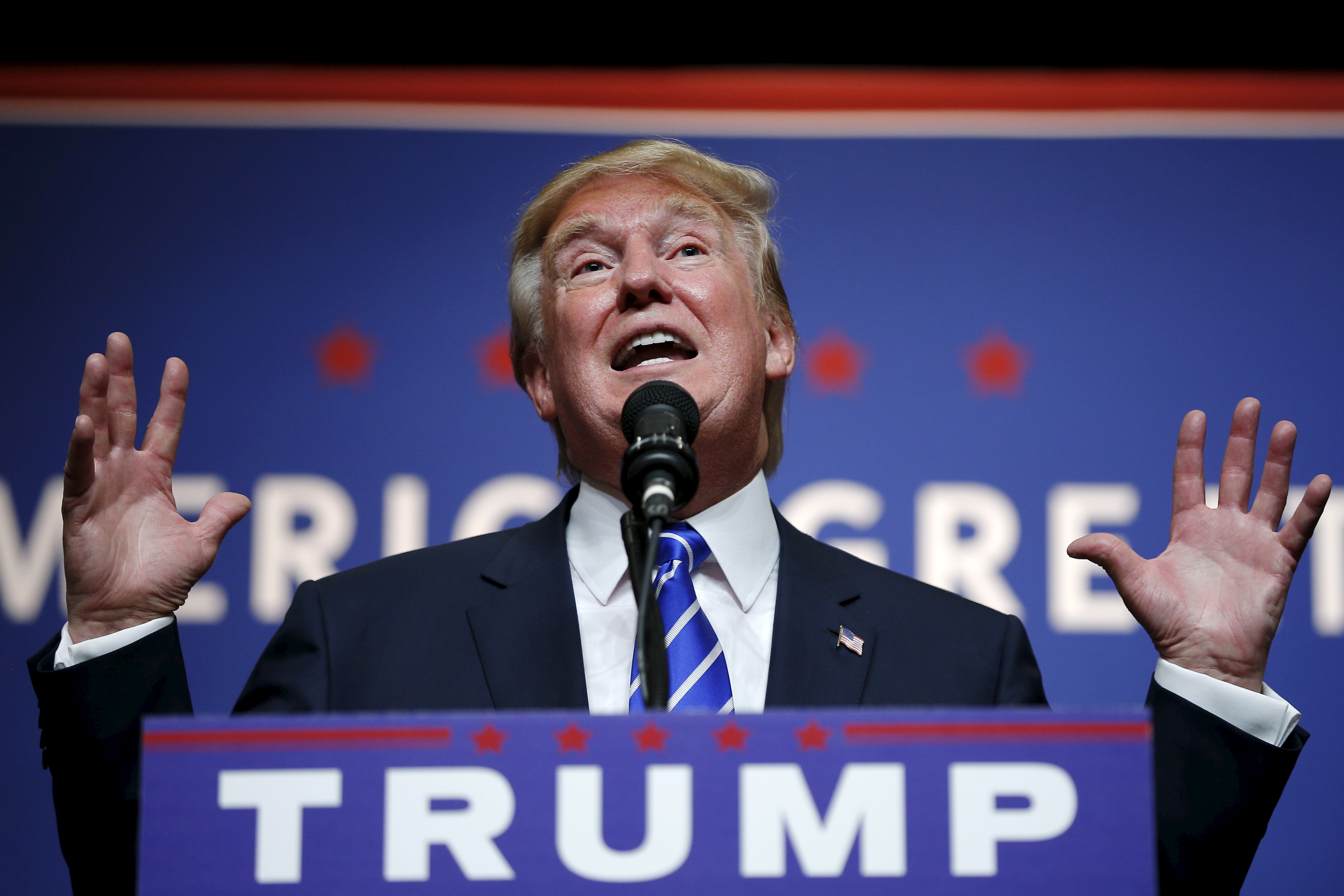Donald Trump's free-trade follies
The GOP must now choose between repudiating its principles or its candidate


Earlier this week, Donald Trump delivered what is being billed as his most substantive policy address yet, promising to return jobs and riches to America through "economic independence." That means scrapping free trade deals and embracing protectionism.
Trump's speech took aim at Hillary Clinton, of course, but the entity he's really shooting in the foot is his own party — which has been championing free trade for at least quarter of a century, in words if not always in deed.
Trump alleged that America has lost nearly one-third of its manufacturing jobs since 1997 and at the "center of the catastrophe are two trade deals pushed by Bill and Hillary Clinton," namely NAFTA and China's entry into the World Trade Organization.
The Week
Escape your echo chamber. Get the facts behind the news, plus analysis from multiple perspectives.

Sign up for The Week's Free Newsletters
From our morning news briefing to a weekly Good News Newsletter, get the best of The Week delivered directly to your inbox.
From our morning news briefing to a weekly Good News Newsletter, get the best of The Week delivered directly to your inbox.
But to paraphrase the epic putdown of writer Lillian Hellman: Every word in that statement is a lie, including "and" and "the."
For starters, Hillary was only the first lady when the deals passed, and had very little to do with them except to make an occasional obligatory speech in support of her husband. She gave NAFTA a tepid endorsement when she ran for Senate in 2000, but stomped all over it when she mounted her 2008 presidential bid and had to face off against Barack Obama, who talked smack about the treaty too.
What really pushed NAFTA over the Sierra Nevada-sized opposition it encountered from labor union-backed Democrats, who controlled both chambers of Congress in 1993, and Ross Perot, the billionaire who warned of a "giant sucking sound" as jobs moved south if NAFTA were implemented, was Republican support.
In the House, 132 Republicans voted for the treaty and a mere 43 against it while 102 Democrats voted for it and 156 against it. Likewise, in the 61-38 Senate vote, 34 Republicans pulled the lever for NAFTA while only 27 Democrats did. Indeed, Newt Gingrich, who is now among Trump's loudest cheerleaders, rallied House Republicans to vote for NAFTA even though it was the brainchild of a Democratic president by declaring: "This is a vote for history, larger than politics, larger than re-election, larger than personal ego."
A free daily email with the biggest news stories of the day – and the best features from TheWeek.com
But conservatives didn't just supply the votes for NAFTA. They also made the intellectual case for free trade, breaking a two-century protectionist streak, whose high (low?) point was Herbert Hoover's notorious 1930 Smoot Hawley trade tariff that triggered a global trade war and exacerbated the Great Depression. Indeed, with the exception of the inveterate conservative protectionist Pat Buchanan, virtually every right-of-center organization and pundit — Cato Institute, the American Enterprise Institute, Heritage Foundation, National Review, The Weekly Standard, and Reason magazine (where I work) — supported NAFTA, although with some qualms that the treaty contained too many boondoggles for favored industries and did not go far enough.
Meanwhile, Trump hilariously cited the union-backed Economic Policy Institute to make his case against NAFTA — which he berated as the "worst trade deal in history." He later compared it to "rape."
At the heart of his argument is the belief that selling to countries is good and buying from them is bad, the crude mercantilist fallacy that Adam Smith's Wealth of Nations debunked in the same year that America embraced the Declaration of Independence. Smith, the brilliant British political economist, argued that unless people start eating gold bullion, the point of wealth is to buy not sell; to consume not produce. If China starts shipping free plasma TVs to America, a few American companies may be thrown out of business, but American consumers will be better off. What's more, they'll be able to spend their savings on goods from other companies. The only folks that protectionist policies benefit are crony capitalists who face less competition — the very thing that Trump says he's fighting.
But even from the mercantilist standpoint of selling stuff abroad, NAFTA has been a huge boon. When it was passed, America's tariffs on Mexico averaged 3 percent and Mexico's on America 10 percent. Because NAFTA equalized tariffs, U.S. manufacturing output post-NAFTA reached record highs.
Cato Institute's Dan Ikenson notes that by all relevant metrics — output, value added, revenues, exports, imports, investment, R&D expenditures — U.S. manufacturing remains a global powerhouse. It attracts $1 trillion in foreign direct investments, the highest in the world, and more than double what China's manufacturing sector attracts. The auto industry alone (which Trump keeps threatening with punishing fines if it moves any operations to Mexico) has seen vehicle production more than double from 5.7 million in 2009 to 12 million by 2015. The U.S. exported over 2.1 million cars in 2014, becoming the third largest auto exporter after Germany and Japan, with Mexico as a distant seventh.
And the U.S. economy has added close to 31 million payroll jobs since NAFTA, despite relentless automation — the real "job killer."
Manufacturing's relative share of the American economy is smaller today than it was when NAFTA was passed. But that's mainly because the service sector has grown — in no small part thanks to the barriers to American banking, financial companies, and other similar industries that this treaty and other trade deals have knocked down.
Trump used to understand at least some of this. He praised "outsourcing" for creating IT jobs and raising wages even though he said it was an "unpopular stance." But he has the squishy ethics of a used car salesman. You cannot trust that what he says today will be true tomorrow.
Of course, other Republicans have done anti-trade things, too. Ronald Reagan imposed quotas on Japanese auto makers. George Bush imposed steel tariffs. And Mitt Romney, like Trump, threatened to label China a currency manipulator. These were all no doubt politically craven acts meant to court key constituencies, but they were sold as departures from standing conservative policy, not as conservative policy. Trump has given up even on the pretense of free trade.
The only effect Trump's overwrought accusations will have on Hillary is to pull her even more in a protectionist direction. This will help her reduce the cognitive dissonance between her and her party's labor base, especially if she sweetens the deal by throwing in a little card check to make it easier to unionize companies.
Meanwhile, Trump has dramatically increased the dissonance between him and the GOP. The party must now choose between repudiating its principles or its candidate: If it picks Trump, it'll have to explain to the American public why it kept pushing free trade if it meant decimating the economy. And if it picks its principles, then it'll have to distance itself from Trump and hope he loses.
The GOP would be better off sticking to its principles. Trump doesn't need or deserve a champion. But free trade desperately does.
Shikha Dalmia is a visiting fellow at the Mercatus Center at George Mason University studying the rise of populist authoritarianism. She is a Bloomberg View contributor and a columnist at the Washington Examiner, and she also writes regularly for The New York Times, USA Today, The Wall Street Journal, and numerous other publications. She considers herself to be a progressive libertarian and an agnostic with Buddhist longings and a Sufi soul.
-
 11 hotels opening in 2026 to help you reconnect with nature
11 hotels opening in 2026 to help you reconnect with natureThe Week Recommends Find peace on the beaches of Mexico and on a remote Estonian island
-
 Zimbabwe’s driving crisis
Zimbabwe’s driving crisisUnder the Radar Southern African nation is experiencing a ‘public health disaster’ with one of the highest road fatality rates in the world
-
 The Mint’s 250th anniversary coins face a whitewashing controversy
The Mint’s 250th anniversary coins face a whitewashing controversyThe Explainer The designs omitted several notable moments for civil rights and women’s rights
-
 Bari Weiss’ ‘60 Minutes’ scandal is about more than one report
Bari Weiss’ ‘60 Minutes’ scandal is about more than one reportIN THE SPOTLIGHT By blocking an approved segment on a controversial prison holding US deportees in El Salvador, the editor-in-chief of CBS News has become the main story
-
 Has Zohran Mamdani shown the Democrats how to win again?
Has Zohran Mamdani shown the Democrats how to win again?Today’s Big Question New York City mayoral election touted as victory for left-wing populists but moderate centrist wins elsewhere present more complex path for Democratic Party
-
 Millions turn out for anti-Trump ‘No Kings’ rallies
Millions turn out for anti-Trump ‘No Kings’ ralliesSpeed Read An estimated 7 million people participated, 2 million more than at the first ‘No Kings’ protest in June
-
 Ghislaine Maxwell: angling for a Trump pardon
Ghislaine Maxwell: angling for a Trump pardonTalking Point Convicted sex trafficker's testimony could shed new light on president's links to Jeffrey Epstein
-
 The last words and final moments of 40 presidents
The last words and final moments of 40 presidentsThe Explainer Some are eloquent quotes worthy of the holders of the highest office in the nation, and others... aren't
-
 The JFK files: the truth at last?
The JFK files: the truth at last?In The Spotlight More than 64,000 previously classified documents relating the 1963 assassination of John F. Kennedy have been released by the Trump administration
-
 'Seriously, not literally': how should the world take Donald Trump?
'Seriously, not literally': how should the world take Donald Trump?Today's big question White House rhetoric and reality look likely to become increasingly blurred
-
 Will Trump's 'madman' strategy pay off?
Will Trump's 'madman' strategy pay off?Today's Big Question Incoming US president likes to seem unpredictable but, this time round, world leaders could be wise to his playbook
